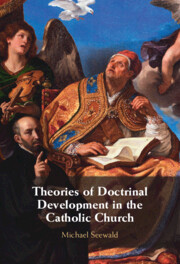
- Publisher:
- Cambridge University Press
- Online publication date:
- February 2023
- Print publication year:
- 2023
- Online ISBN:
- 9781009271974

The contemporary Catholic Church finds itself in deep crisis as it questions which elements are essential to the Catholic faith, and which can be changed. Bringing a longue durée perspective to this issue, Michael Seewald historicizes the problem and investigates how theologians of the past addressed it in light of the challenges that they faced in their time. He explores the intense intellectual efforts made by theologians to explain how new components were added to Christian doctrine over time, and that dogma has always been subject to change. Acknowledging the historic cleavage between 'conservatives' who refer to tradition, and reformers, who formulate their arguments to address contemporary needs, Seewald shows that Catholic thought is intellectually expansive, enabling the Church to be transformed in order to meet the challenges of the present day. His book demonstrates how theology has dealt with the realization that there is a simultaneity of continuity and discontinuity in doctrinal matters.
‘Michael Seewald has written a compelling and important book about the vital, but neglected, topic of doctrinal development in the Catholic church. In a work that is historically grounded, philosophically sophisticated, and intellectually honest, Seewald probes the theological complexities of a faith tradition that is forged through continuity and change. He explores the nuances and ambiguities of doctrinal development through history, and he charts a path to a future that is shaped by the possibilities afforded by this dynamic understanding of the Catholic tradition. This beautifully written and subtly argued work is a must-read for anyone interested in the Catholic tradition and its evolution.’
Linda Hogan - Professor of Ecumenics, Trinity College Dublin, Ireland
‘Michael Seewald teaches us how Catholicism has continuously found in its foundational teachings new meanings for new times, while always understanding itself as true to its origins. As if that were not enough, the questions he illuminates apply to every ‘historical’ faith, that is, to any religion that asks its believers to orient their lives in the present through teachings from the past. Theories of Doctrinal Development is a book we urgently need, as our communities struggle to articulate the relationship between historical change and continuity of faith.’
David Nirenberg - Leon Levy Professor and Director of the Institute for Advanced Study in Princeton, USA
‘Seewald’s passage through the theorization of doctrinal development, a passage rich in materials, brings to light various historical possibilities for relating faith and revelation, Bible and dogma, truth, language and history, as well as theology and magisterium, one to the other. This disrupts familiar ways of thinking and familiar structures, and broadens the horizon of what can be thought … What makes this book so compelling are his observations, which he develops closely from the sources, which he contextualizes with great expertise, and which he names trenchantly. Extremely helpful is also Seewald’s prototypical paradigm of approaches to the theory of development.’
Julia Knop - Professor of Dogmatics, University of Erfurt Germany, Communio
‘Don’t dogmas have to change if they want to remain faithful to the Gospel in changed circumstances? And doesn’t the understanding of revelation deepen with time, so that a further development of dogmas is necessary? These questions are explosive. The Münster theologian Michael Seewald tackles them courageously. He has a clear eye for the historical and systematic aspects, and develops his argument in clear chapters in an erudite, succinct, and easily comprehensible manner … Determining the content of dogma may be provocative, and it certainly demands ever new definitions, but it corresponds to the fact that God has determined and proclaimed Himself as a God who is kind to the human being. Michael Seewald’s impressive study has also reminded us that it is worth thinking about this anew in an age tired of dogma.’
Jan-Heiner Tück - Professor of Dogmatics and the History of Dogma, University of Vienna Austria, Bücher der Gegenwart
‘Doesn’t dogma smell of eternity? Especially in the Catholic Church, which, they say, is humankind’s oldest religious institution? Michael Seewald, Catholic dogmatist at the University of Münster, has given this idealistic understanding of dogma a first-class funeral … Seewald has written a sparkling book, one that does nonetheless require an interest in the finer points of theology. It takes up the research carried out in academic theology over the last few decades - and goes beyond it.’
Helmut Zander - Professor for the Comparative History of Religion, Université de Fribourg (Switzerland), Neue Zürcher Zeitung
 Loading metrics...
Loading metrics...
* Views captured on Cambridge Core between #date#. This data will be updated every 24 hours.
Usage data cannot currently be displayed.